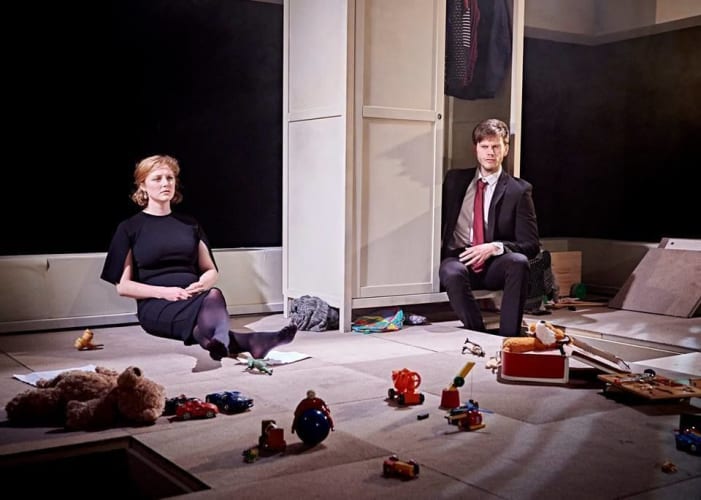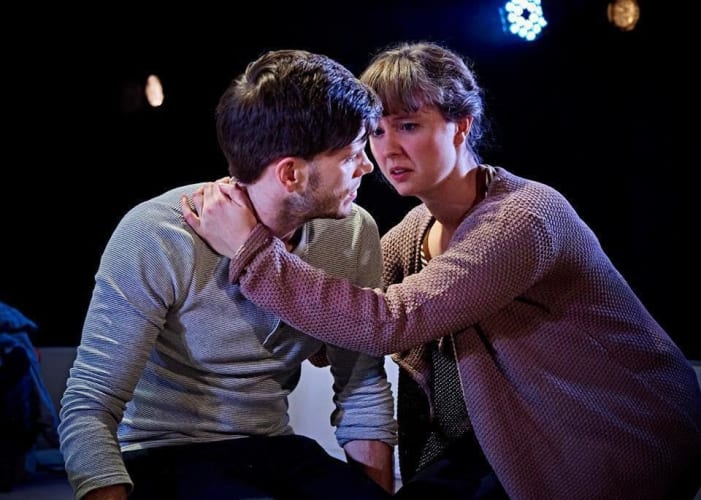You wait years for an updated, loose adaptation of a late work by one of the fathers of modern, psychologically realistic text-based theatre, and then two come along at the same time.
Across town, Gary Owen’s take on Chekhov’s The Cherry Orchard is receiving universal critical acclaim. Meanwhile, at Chapter, writer and director Simon Harris (perhaps best known for his play Badfinger and as one-time Artistic Director of much-missed new writing company Sgript Cymru, which gave Owen early encouragement), brings us his version of Henrik Ibsen’s Little Eyolf.
Harris’s Lucid Theatre Company has been in existence for a while, largely occupied with organising discussion events focussing on the business of theatre-making. This, its first production, has been in development for some years, inspired, according to pre-publicity interviews, by an enduring memory of the 1982 BBC television version of the original, starring Anthony Hopkins and Diana Rigg as the central protagonists.
It should be pointed out that the piece deals with that most dreadful of tragedies—the loss of a child.
As the action begins, the golden couple, aspiring philosophical novelist Alfred Allmers and his wealthy young wife, Rita, played by Gwydion Rhys and Alex Clatworthy respectively, are in turmoil over the disappearance of their disabled son, Wolf, who has gone wandering, apparently entranced by a mystical female visitor. And even before their worst fears have been confirmed, things are said which call into question the stability of their relationship.
Alfred’s ostensibly spinsterish half-sister, Melangell Dolma’s Asta, makes herself available as a shoulder for the couple to cry on. She has issues of her own to deal with, however. There is the messy aftermath of a not-entirely-successful drunken fumble with a visiting Internet engineer, Lars, played by John-Paul MacLeod, whose love for her is unrequited. Not to mention her possibly incestuous feelings for Alfred, which are mercilessly skewered by Rita.
While Harris has overlain Ibsen’s basic situation with brittle, contemporary dialogue, several of the latter’s themes remain. Rita is a difficult, complicated heroine (cf Hedda Gabler), entangled with Alfred’s high-minded intellectual (An Enemy Of The People), to whose supposed genius Asta is in thrall (The Master Builder). We get the impression that the family has existed for some time in an uneasy equilibrium which is tipped into terminal crisis by the loss of little Wolf.
Inevitably, the tone is serious, but not utterly grim. Uneasy humour intrudes, via Rita’s sarcasm, Lars’s awkward, bemused normality, and Alfred’s tendency to hide in the wardrobe.
Holly Piggot’s set—a part-enclosed white box, initially strewn with childrens’ toys—is almost a parody of Scandinavian design perfection, with floorboards which are easy to disassemble, as the distraught Alfred seeks to bury himself beneath his lost son’s playroom.
Jane Lalljee’s lighting design is fuzzy and dreamlike, highlighting the unnaturalness of the situation in which the family finds itself. The scene transitions are soundtracked by nursery rhymes—perhaps a clichéd means of signifying shattered innocence, but effective nonetheless.
Wolf does manifest himself, both via Jorge Lizalde’s woozy video projections and in separate, imagined conversations with both unhappy parents. His guilelessness makes for a potent contrast with the interpersonal complexity on show amongst the adults; guilt, anger, lust, exploitativeness and emotional manipulation all part of the mix, as a love-rectangle threatens to develop.
Harris, as both writer and director, gives us dazed, beautiful people suffering wittily and stylishly and is well served by a talented cast. He resists the temptation to replicate the altruistic note on which Ibsen concluded his original, nor does he plump for nihilism. We are instead left with a hint of hopefulness, which comes as a welcome relief.
Following the Cardiff run, Little Wolf embarks on a brief Welsh tour. The show is highly recommended for fans of darkly elegant Scandinavian miserablism.


